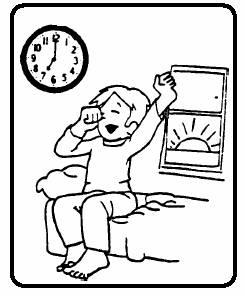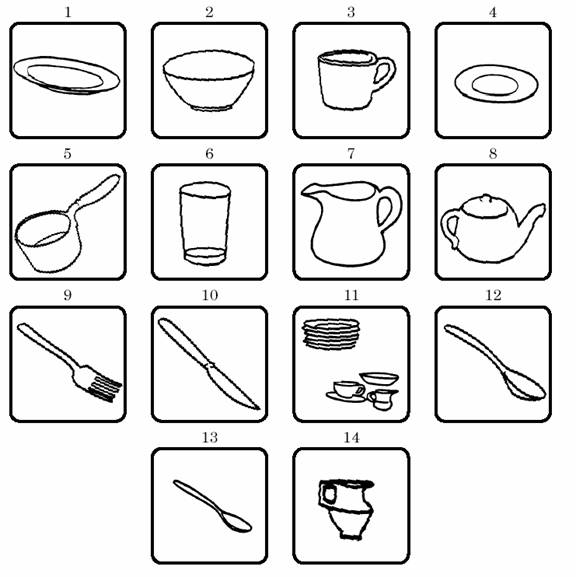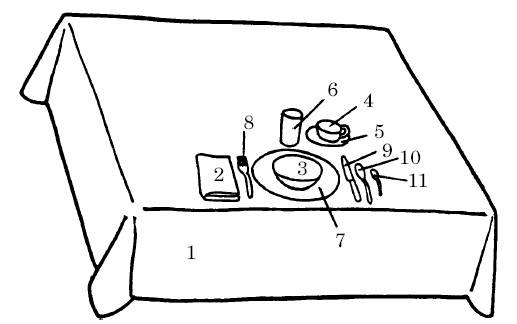
In Lesson 2 you will focus your attention on Ukrainian vocabulary associated with place settings, mealtime, numbers and the calendar. The importance of gender agreement between adjectives and nouns will be highlighted. You will also work with two cases, the Locative and the Genitive, in the following contexts:
1. Місцевий відмінок – used after the preposition о(об) when stating the time of day (specifically, the hour).
2. Родовий відмінок –used to answer questions about the date on the calendar.
| Здається (мені*)... |
It seems (to me)... |
| Ой, як... |
Oh, how... |
*the pronoun is implied by the verb
In order to be able to tell time (on the hour) or relate the date on a calendar, you will need to deepen your understanding of two cases, the Locative and the Genitive.
Which Hour Is It? 
In Dialogue 13, Petryk and Taras make reference to the early hour of the day:
 |
У тексті ми чуємо: |
| Котра година? |
 |
|
Здається, восьма.
|
 |
|
In English we use cardinal numbers to state the hour of the day. For example, we say:
It's five o'clock.
It's ten o'clock.
To state the hour in Ukrainian, the ordinal number is used together with the word година (hour), as follows:
Тепер п’ята година. (Now it's the fifth hour.)
Тепер десята година. (Now it's the tenth hour.)
Do you remember the difference between cardinal and ordinal numbers from your math class? Cardinal numbers express a specific quantity (five, ten), while ordinal numbers express the particular order of items (fifth, tenth). The English expression “It's five o'clock ” indicates that five hours have passed (quantity). In Ukrainian, the expression “It's the fifth hour” indicates the placement of the hour within the day (order). Study the columns given below. The first column contains cardinal numbers, while the next three columns list ordinal numbers by gender.
How many?
Скільки? |
Which one?
Котрий? |
Which one?
Котра? |
Which one?
Котре? |
| |
|
|
|
один
два
три
чотири
п’ять
шість
сім
вісім
дев’ять
десять
одинадцять
дванадцять |
перший
другий
третій
четвертий
п’ятий
шостий
сьомий
восьмий
дев’ятий
десятий
одинадцятий
дванадцятий |
перша
друга
третя
четверта
п’ята
шоста
сьома
восьма
дев’ята
десята
одинадцята
дванадцята |
перше
друге
третє
четверте
п’яте
шосте
сьоме
восьме
дев’яте
десяте
одинадцяте
дванадцяте |
Have you noticed that the ordinal numbers are all adjectives? This means that ordinal numbers must take the gender of the nouns which they modify. These ‘number adjectives' modify nouns in the same way as the ‘colour adjectives' and ‘weather adjectives' given in the previous two Units. Study the examples of adjective-noun gender agreement which are given below.
Cardinal numbers
1, 2, 3 |
|
Ordinal numbers (masculine, feminine, neuter)
1st, 2nd, 3rd |
| |
|
|
один вареник
два журнали
три чоловіки |
|
перший вареник --- перша дочка --- перше кіно
другий журнал --- друга морква --- друге крісло
третій чоловік --- третя година --- третє місто |
Now let’s focus once again on the hour of the day. The word година (hour) is a feminine noun, therefore the ordinal numbers which modify it will also be in the feminine gender, ending in a or я. The interrogative pronoun for feminine ordinal numbers, as you’ve noted in the columns above, is always Котра? (Which?).
А. Називний відмінок: Котра година?
The response to this question takes the Nominative Case.
Котра година? Перша година.
What time is it ? It’s one o’clock.
(Literally: Which hour is it?)
Study the statement about time under each clock.

|
Тепер перша година. |
Тепер друга година. |
Тепер третя година. |
|
|
|

|
Тепер четверта година. |
Тепер п'ята година. |
Тепер шоста година. |
|
|
|

|
Тепер сьома година. |
Тепер восьма година. |
Тепер дев'ята година. |
|
|
|

|
Тепер десята година. |
Тепер одинадцята година. |
Тепер дванадцята година. |
|
|
|
XIII. Exercise 2.i
Complete the exercise by writing in the time indicated. Read your answers out loud.
Котра година?
|
1. |
6:00 |
____________________________________________
|
2. |
11:00 |
____________________________________________
|
3. |
3:00 |
____________________________________________
|
4. |
5:00 |
____________________________________________
|
5. |
2:00 |
____________________________________________
|
6. |
10:00 |
____________________________________________
|
7. |
4:00 |
____________________________________________
|
8. |
9:00 |
____________________________________________
|
9. |
7:00 |
____________________________________________
|
10. |
12:00 |
____________________________________________
|
11. |
1:00 |
____________________________________________
|
12. |
8:00 |
____________________________________________
|
Б. Місцевий відмінок: О котрій годині?
If you would like to find out the time of a particular event, the following questioning pattern is used:
For specific inquiries: О котрій годині…? (At which hour…?)
For general inquiries: Коли…? (When…?)
When answering these questions, the Locative Case is used, together with the preposition o (at).
You have already learned that feminine nouns change their ending from а to і in the Locative Case after the preposition у/в. The same pattern applies after the preposition o: година --- годині. In addition, the feminine adjective котра changes its form to котрій in the Locative Case, for adjective-noun agreement.
котра година --- о котрій годині
перша година --- о першій годині
сьома година --- о сьомій годині
одинадцята година --- об* одинадцятій годині
*the variation об is used only with the word одинадцятій.
XIII. Exercise 2.ii
Write the phrase which answers the question ‘О котрій годині?’ in the space provided under each clock.

|
1. __________________ |
2. __________________ |
3. __________________ |
|
|
|

|
4. __________________ |
5. __________________ |
6. __________________ |
|
|
|

|
7. __________________ |
8. __________________ |
9. __________________ |
|
|
|

|
10. _________________ |
11. _________________ |
12. _________________ |
|
|
|
XIII. Exercise 2.iii
Study the example provided and complete the exercise.

|
1. Уже сьома година.
Час уставати! |

|
2 . _________________ |

|
6 . _________________ |
|
|
|
|

|
3 . _________________ |

|
7 . _________________ |
|
|
|
|

|
4 . _________________ |

|
8 . _________________ |
|
|
|
|

|
5 . _________________ |

|
9 . _________________ |
Tableware
You were introduced to many new food words in the previous Unit. In Unit XIII you will learn vocabulary for tableware and for a typical place setting. Study the names of the items of tableware pictured below.

Кухонний посуд
|
1. тарілка |
6. склянка |
11. начиння (посуд) |
2. миска |
7. збанок |
12. ложка |
3. горнятко |
8. чайник |
13. ложечка |
4. підставка |
9. виделка |
14. збаночок |
5. баняк |
10. ніж |
|
Now study the names of the items in a typical place setting.

Що на столі?
|
1. обурс |
7. тарілка |
2. серветка |
8. виделка |
3. миска |
9. ніж |
4. горнятко |
10. ложка |
5. підставка |
11. ложечка |
6. склянка |
|
XIII. Exercise 2.iv
There are only a few items in the list below which aren't on the table pictured above. Find the names of the items and match them to the appropriate sentences on the right.
1. Склянка
2.Тарілка
3. Серветка
4. Ніж
5. Баняк
6. Збаночок
7. Виделка
8. Підставка
9. Ложечка
10. Збанок
11. Миска
12. Горнятко
13. Ложка
14. Чайник
15. Обрус
16. Посуд*
|
|
_____ на столі.
_____ не на столі.
_____ на столі.
__2__ на столі.
_____ не на столі.
_____ на столі.
_____ на столі.
__1__ на столі.
_____ не на столі.
_____ на столі.
_____ на столі.
_____ на столі.
_____ на столі.
_____ на столі.
_____ не на столі.
_____ на столі. |
* this is a collective noun
XIII. Exercise 2.v
Circle the nouns that do not belong in each row. Use your dictionary if you are unsure of the meanings.
1. |
спальня |
вітальня |
їдальня |

|
2. |
крісло |
комірка |
ліжко |
шафа |
3. |
ложечка |
підставка |
коридор |
ніж |
4. |
диван |
лазничка |
вітальня |
коридор |
5. |
холодильник |
горнятко |
радіо |
телевізор |
6. |
тарілка |
виделка |
дзеркало |
склянка |
7. |
кухня |
спальня |
лазничка |
ложка |
8. |
щафа |
музика |
диван |
ліжко |
9. |
ліжко |
ніж |
ложка |
тарілка |
10. |
кухня |
їдальня |
комірка |
коридор |
Calendar Dates 
The course e-mova: Core Ukrainian 10 introduced the names of the months of the year. Study the names of the months to refresh your memory.
січень
лютий
березень
квітень
травень
червень
|
|
липень
серпень
вересень
жовтень
листопад
грудень |
XIII. Exercise 2.vі
Which month is it? Answer the question with a complete sentence.
Який тепер місяць? Тепер квітень.
| ____________________ |
 |
____________________ |
 |
| |
|
|
|
| ____________________ |
 |
____________________ |
 |
| |
|
|
|
| ____________________ |
 |
____________________ |
 |
What's the Number Today?  When an English speaker is asked the question, ‘What's the date today?' the response automatically includes the number and often the month. You will likely hear the following: ‘It's March 12th ' or ‘Today is the 25th of June'.
If we ask a Ukrainian speaker about the date, the question refers specifically to the number on the calendar:
Котре сьогодні число? Which number is it today?
Сьогодні перше (число*) січня. It’s the first (number) of January.
*the word число is understood, but not stated
Notice that the word перше (first) is an ordinal number. It is also an adjective, which means that it must take the neuter form, to agree with the noun число. This is the appropriate pattern for relating the day of the month in Ukrainian. If you examine the question more closely, you will see a clue to the answer. The word котре (which) is an interrogative pronoun which appears in the neuter form. The interrogative pronoun, like the adjective, must agree with the neuter noun число.
Котре число? Перше число.
The ordinal numbers in neuter gender are listed in the calendar shown below. Acquaint yourself with the form needed to respond to questions about the calendar date.
|
січень
|
неділя
|
понеділок
|
вівторок
|
середа
|
четвер
|
п’ятниця
|
субота
|
|
1 перше
(число)
|
2 друге |
3 третє |
4 четверте |
5 п’яте |
6 шосте |
7
сьоме
|
8
восьме
|
9
дев’яте
|
10
десяте
|
11
одинадцяте
|
12
дванадцяте
|
13
тринадцяте
|
14
чотирнадцяте
|
15
п’ятнадцяте
|
16
шістнадцяте
|
17
сімнадцяте
|
18
вісімнадцяте
|
19
дев’ятнадцяте
|
20
двадцяте
|
21
двадцять
перше
|
22
двадцять
друге
|
23
двадцять
третє
|
24
двадцять
четверте
|
25
двадцять
п’яте
|
26
двадцять
шосте
|
27
двадцять
сьоме
|
28
двадцять
восьме
|
29
двадцять
дев’яте
|
30
тридцяте
|
31
тридцять
перше
|
|
|
|
There is one more grammatical feature to note when speaking about the date.
Котре сьогодні число? Сьогодні перше січня.
Did you notice that the name of the month changed from січень to січня? In English, the response ‘Today is the first of January’ includes the preposition 'of'. In Ukrainian, the preposition 'of' is not needed. The Genitive Case ending replaces this preposition.
The comparative list below illustrates how the form of each month changes from the Nominative Case to the Genitive Case. (Hint: The same endings are used after the preposition ‘до’ which is also governed by the Genitive Case.)
| Називний Відмінок |
|
Родовий Відмінок |
січень
лютий
березень
квітень
травень
червень
липень
серпень
вересень
жовтень
листопад
грудень
|
|
січня
лютого
березня
квітня
травня
червня
липня
серпня
вересня
жовтня
листопада
грудня |
If you combine the information which you have learned about the date and the month, you are able to answer the question: Котре сьогодні число?
XIII. Exercise 2.vi
Answer the question using the pattern which has been presented in this lesson.
Котре сьогодні число?
1. січень (23) - Сьогодні ________________________________________
2. лютий (14) - Сьогодні ________________________________________
3. березень (17) - Сьогодні ________________________________________
4. квітень (1) - Сьогодні ________________________________________
5. травень (8) - Сьогодні ________________________________________
6. червень (25) - Сьогодні ________________________________________
7. липень (2) - Сьогодні ________________________________________
8. серпень (6) - Сьогодні ________________________________________
9. вересень (29) - Сьогодні ________________________________________
10. жовтень (31) - Сьогодні ________________________________________
11. листопад (11) - Сьогодні ________________________________________
12. грудень (20) - Сьогодні ________________________________________
You were introduced to ordinal numbers as adjectives in this lesson. One new adjective was introduced in the dialogue of Unit XIII.
 |
У тексті ми чуємо: |
| Сніданок готовий! |
 |
|
As with other adjectives, the word готовий (ready) takes the gender of the noun which it describes. In this case, there is one note of caution. Do not let the placement of the word ‘ready’ in a sentence confuse you. The word order must be inverted in order to understand the gender agreement, as follows:
готовий сніданок (masculine)
готова вечеря (feminine)
готове домашнє завдання (neuter)
готові вареники (plural)
XIII. Exercise 2.vii
Complete the exercise with the time and correct form of the adjective готовий.
приклад: 1:00, діти – Тепер перша година. Діти готові!
1. 3:00, перекуска – _______________________________________
2. 12:00, обід – ___________________________________________
3. 9:00, завдання – _________________________________________
4. 7:00, вечеря – __________________________________________
5. 10:00, чай – ____________________________________________
6. 11:00, ліжко – ___________________________________________
7. 2:00, мама – ____________________________________________
8. 8:00, хлопці – ___________________________________________
9. 6:00, борщ – ____________________________________________
10. 4:00, кухня – ___________________________________________
|

































